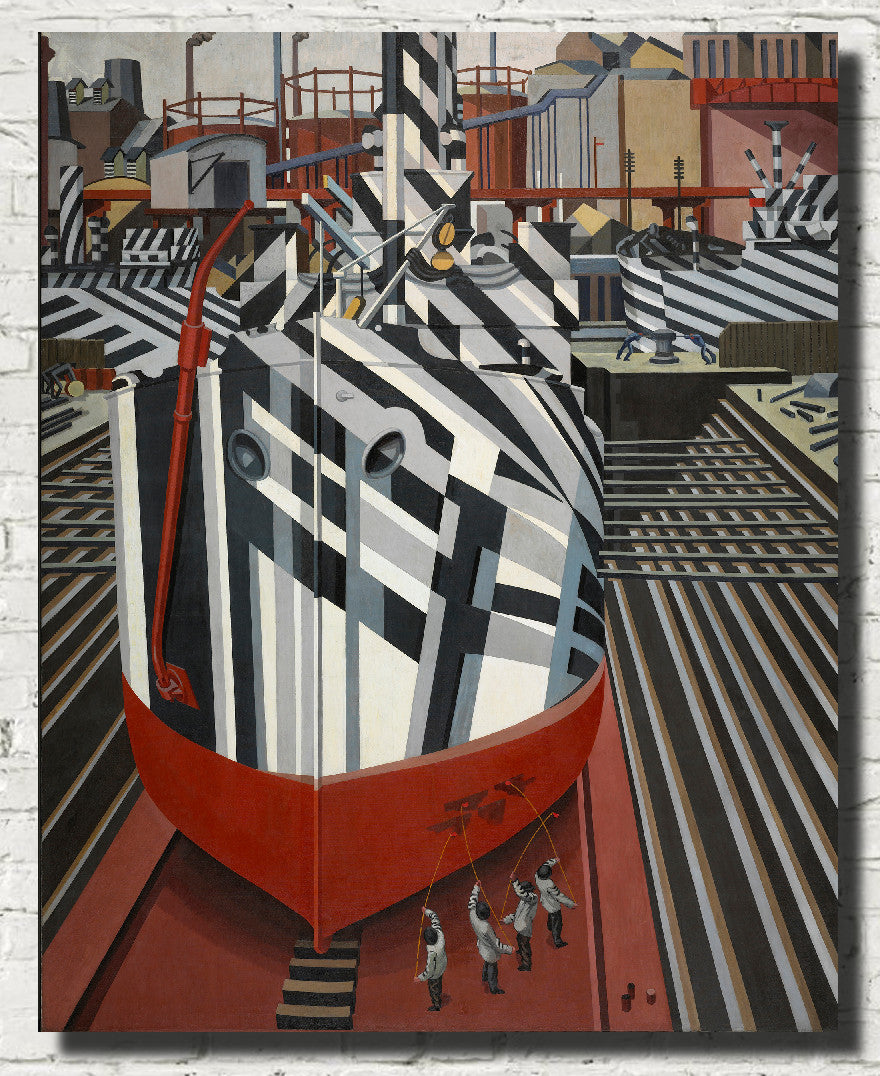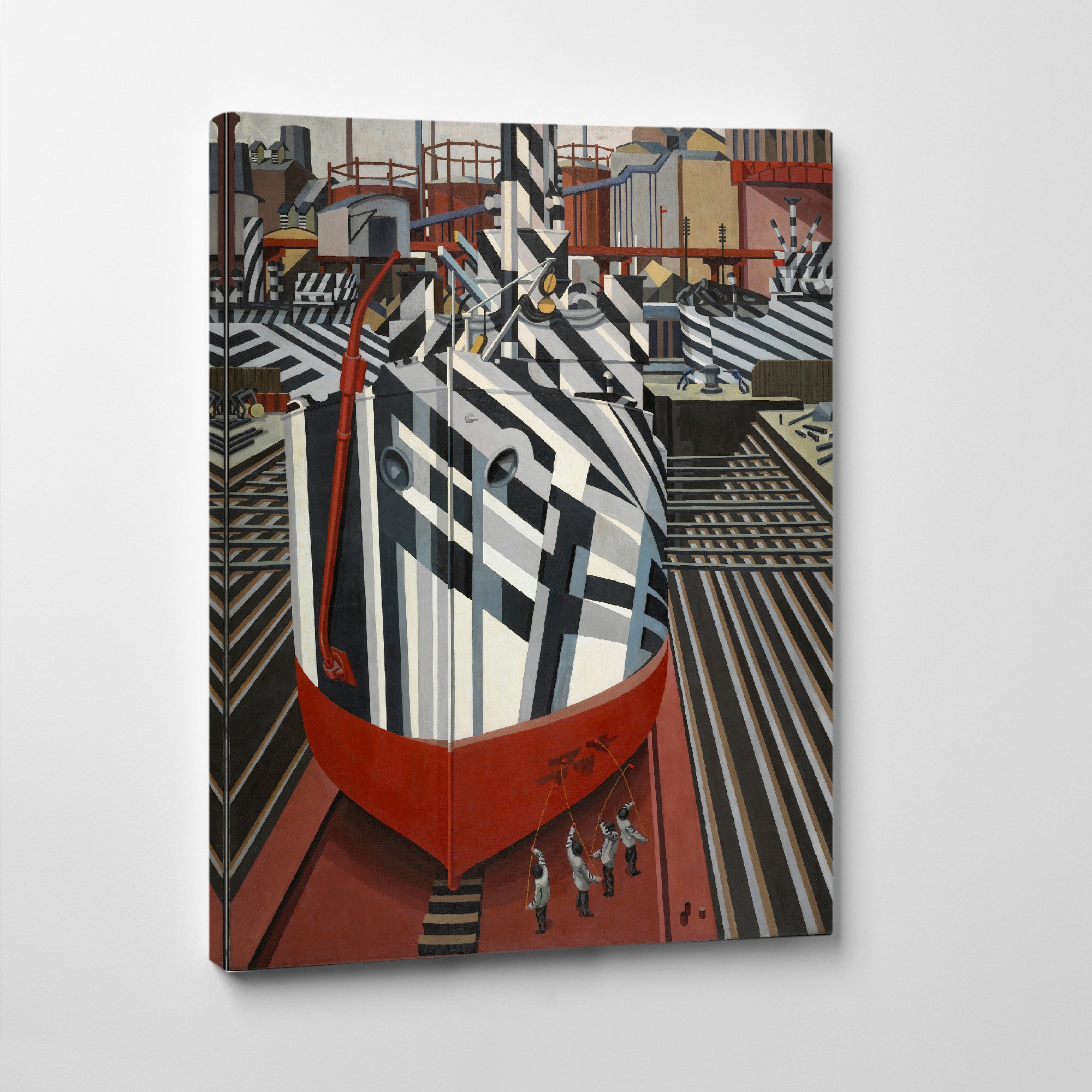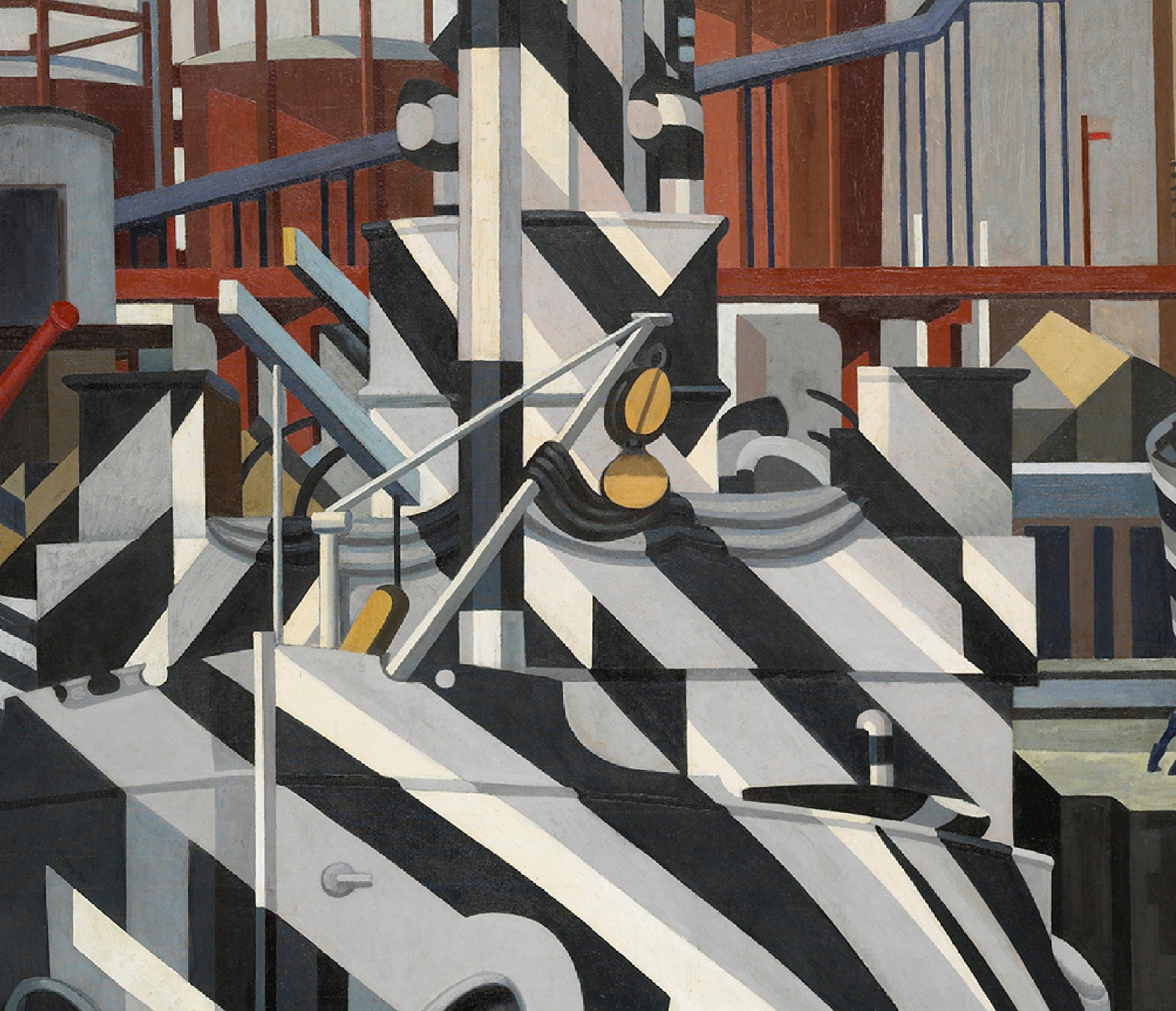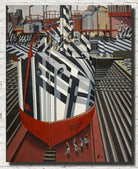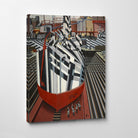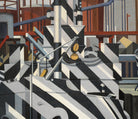Dazzle-ships in Drydock at Liverpool, Edward Wadsworth
Couldn't load pickup availability
At the start of the 20th century, just before the war, a man named Norman Wilkinson convinced the English navy to take ship camouflage to the next level. Rather than aim for invisibility, he sought to confuse the opposing armies to greatly hinder their ability to aim and hit the ships.
To convince the English navy to give dazzle camouflage a try, Wilkinson made a model dazzle ship and challenged King George V to predict it’s direction. When the king failed to do so correctly, he grew agitated. Wilkinson presented the same challenge to a high ranking official in the English Navy who then also failed the challenge. The official responded with “How the hell do you expect me to predict the course of a ***** thing all painted up like that?”, successfully proving Wilkinson’s point.
Our artist Wadsworth wasn’t involved in the conception of dazzle camouflage, but has since become one of the most recognizable names associated with the project. This painting in particular, his first after the war ended, saw a great surge in popularity for the artist. Wadsworth worked as one of the camoufleurs tasked with designing and painting the geometric patterns for English naval ships. When the ships docked, as portrayed here in the painting, they caught the attention of all those around, dazzling them as it were.
The idea behind dazzle camouflage was to use conflicting geometric shapes and vertical lines of black and white to make the path of the ship indecipherable to enemy attackers. If an opposing submarine couldn’t determine where the ship was headed, they couldn’t correctly target their torpedoes and the beautiful ships would sail on unharmed.
Overall, the dazzle camouflage project was deemed a success — especially in the eyes of the public. However, research conducted in the years following the war argue that its supposed success may be attributed to other developments in the English navy. Nonetheless, the idea of dazzle camouflage fascinated the public at the time. So when statistics were released that showed ship sinkings had decreased since the ships were bedazzled, the press ran with it. Dazzle camouflage became so popular that it made its way into fashion, with fabrics recreating the same patterns. The resulting popularity led Picasso to boast that dazzle camouflage was inspired by the cubist movement.
While the ship sinkings had decreased, reports comparing how often the ships with dazzle camouflage and the ships without were hit or sunk showed the difference was minimal. There wasn’t much to support that dazzle camouflage worked as intended or as well as the press claimed. But, it was said that the morale of the crews on the dazzle ships was much higher than those without because they felt so confident in the project and the protection the paint gave them.
Edward Alexander Wadsworth ARA (29 October 1889 – 21 June 1949) was an English artist, closely associated with modernist Vorticism movement. He painted coastal views, abstracts, portraits and still-life in tempera medium and works printed using wood engraving and copper. In the First World War he designed dazzle camouflage for the Royal Navy, and continued to paint nautical themes after the war.


All prints are made using archival art stocks and UV pigment inks to give up to 200 years life. Prints are sold unframed and unmounted.
Quick Comparison: Finding Your Perfect Style
| Art Style | Best For... | Visual Impact | Recommended Room |
|---|---|---|---|
| Expressionism | Open floor plans | Bold, emotional focal point | Living Rooms / Entryways |
| Nordic & Scandinavian | Hygge-inspired interiors | Muted tones and "Lagom" balance | Bedrooms / Cozy Nooks |
| Botanical & Nature | High-stress spaces | Biophilic calm and relaxation | Home Offices / Nurseries |
| Impressionism Prints | Soft, airy aesthetics | Dynamic light and gentle movement | Dining Rooms / Guest Rooms |
| Geometric Modern | Architectural interest | Reinforces clean lines | Studios / Hallways |
All orders for unframed fine art prints and original paintings are dispatched within 2 working days of receipt of payment.
Orders for custom framed prints are dispatched within 4 working days.
All orders are fully tracked from dispatch to delivery at your home or business.
All print and original painting orders are fully insured against loss or damage in transit. We refund or replace any damaged or lost orders.
Buy with confidence - read what our satisfied customers have to say - Reviews
Fine art papers are printed without any additional white border Please let us know at the time of ordering if you would like a small additional white border.
Rolled canvas options have an additional white border of approximately 2.5 inches (7cm) on all 4 sides to aid stretching.
Ready to hang canvas panels are stretched on 1.5 inch deep solid pine frames from sustainable forestry sources. The image is mirrored on all 4 sides to give an aesthetically pleasing finish.
Why not have us gift wrap your order and attach a personalised message to the recipient. Available for all orders. Each order is hand wrapped in high quality gift wrap with meatllic ribbon and bow. Your personalised message is printed on a card which is included with your order.
Have your hand wrapped gift delivered directly to the recipient.
Full tracking and insurance included with every order.
Please note design may vary depending upon availability
Just purchase the gift wrap option HERE
Why Choose GalleryThane?
- Printed and framed in-house
- Free UK delivery
- Free EU an USA delivery on orders over £200
- Tracking and insurance included in every order
- Fast 1-3 day dispatch
- Gift wrapping service available
- Gallery quality materials
- Sustainable, eco-friendly packaging
- Great customer support
What makes our Prints and Canvas Panels so special

Latest Giclee Printing Technology
We have invested in the latest wide format print technology to produce museum quality giclee prints utilising the highest quality pigment inks to give outstanding colour reproduction.

Museum Quality Archival Fine Art Papers
We print on the finest quality fine art papers with textured, smooth and lustre finishes for prints which last a lifetime.
From aceo miniatures to 40x80 inch large format, every print has our lifetime quality guaranteee.

Solid Wood Frames, Cotton Canvas
All of the wood for our canvas panels and frames is responsibly sourced from manages forests. Our cotton canvas is completely seedless for the highest quality reproduction possible.

